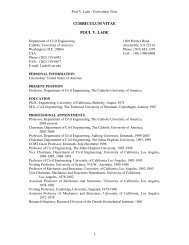Nota Bene-- C:\ARTICLES\TERMIN~1.NB Job 1 - the Catholic ...
Nota Bene-- C:\ARTICLES\TERMIN~1.NB Job 1 - the Catholic ...
Nota Bene-- C:\ARTICLES\TERMIN~1.NB Job 1 - the Catholic ...
Create successful ePaper yourself
Turn your PDF publications into a flip-book with our unique Google optimized e-Paper software.
proclamation aimed at turning Israel away from <strong>the</strong> righteousness based on doing <strong>the</strong><br />
works of <strong>the</strong> Law (Lev 18:5) and toward God’s own righteousness based upon faith<br />
(Rom 10:4).<br />
2. Romans 10:6-8 and Deuteronomy 30:11-14<br />
The warning, “Do not say in your heart,” in Rom 10:6 is followed by a scriptural<br />
exegesis of Deut 30:11-14, linked to Deut 8:17-18 and 9:4-6 by yet ano<strong>the</strong>r gezera<br />
shava based on <strong>the</strong> phrase, “in your heart” (ε� ν τη,^ καρδι'α, σου in Deut 8:17, 9:4, and<br />
30:14). Fur<strong>the</strong>rmore, Deut 30:11-14 is linked to both Deut 8:17-18 and Lev 18:5<br />
through a gezera shava based on <strong>the</strong> word “do” (ε� ποι'ησε'ν and ποιη^σαι in Deut 8:17-18;<br />
ποιη' σας in Lev 18:5; ποιη' σοµεν, ποιη' σει, and ποιει^ν in Deut 30:12-14). Thus, this<br />
whole complex of associated texts and contexts from <strong>the</strong> OT Law in Leviticus and<br />
Deuteronomy mutually interpret and fur<strong>the</strong>r explain one ano<strong>the</strong>r.<br />
Although <strong>the</strong> warning from Deut 8:17 and 9:4 spoken by <strong>the</strong> righteousness from<br />
faith in Rom 10:6, “Do not say in your heart,” is not followed by <strong>the</strong> remainder of ei<strong>the</strong>r<br />
Deut 8:17-18 or 9:4-6, what does follow expresses <strong>the</strong> same basic rhetorical dynamic--<br />
to divert Israel away from <strong>the</strong>ir own accomplishments and “doing” (<strong>the</strong>ir own<br />
righteousness) to accept what God has done for <strong>the</strong>m (<strong>the</strong> righteousness of God). The<br />
reason <strong>the</strong> warning continues with a scriptural exegesis of Deut 30:11-14 is that this<br />
text contains <strong>the</strong> same <strong>the</strong>me as Lev 18:1-5--doing <strong>the</strong> commandments of <strong>the</strong> Law.<br />
Deut 30:11-14 proclaims how close <strong>the</strong> commandment of <strong>the</strong> Law is to Israel so that<br />
<strong>the</strong>y can easily do it. Noteworthy is <strong>the</strong> verse that precedes Deut 30:11-14: “...if you<br />
listen to <strong>the</strong> voice of <strong>the</strong> Lord your God to observe and do (ποιει^ν) all his<br />
commandments and his ordinances and his decisions written in <strong>the</strong> book of this Law...”<br />
(LXX Deut 30:10; cf. LXX Lev 18:5 and Rom 10:5).<br />
The righteousness from faith warns Israel not to say in <strong>the</strong>ir heart, “Who will<br />
ascend into heaven?” (Rom 10:6a). This question reminds <strong>the</strong> audience of Deut 30:11-<br />
12 (LXX): “For this commandment, which I command to you today, is not excessive nor<br />
11
















